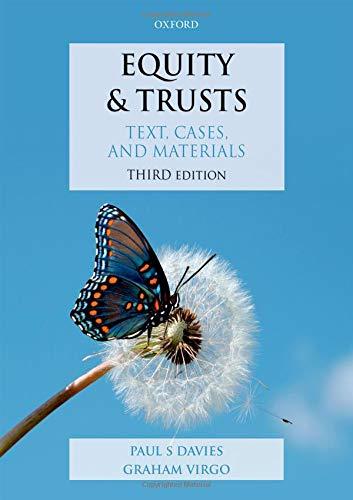Question
Regarding the right to equal protection, which of the following statements is true? Group of answer choices Laws may never make classifications, even when there
Regarding the right to "equal protection," which of the following statements is true?
Group of answer choices
Laws may never make classifications, even when there is a compelling state interest.
Laws must treat persons who are similarly situated equally.
Laws that invade a person's privacy are unconstitutional.
Laws must treat everyone exactly the same.
Laws that are too broad or overly vague are unconstitutional.
tate law always preempts conflicting city or county law.
Group of answer choices
True
False
Which of the following statements regarding "commercial speech" like advertising is true?
Group of answer choices
Commercial speech has partial First Amendment protection (subject to rational basis review).
Commercial speech has full First Amendment protection (subject to strict scrutiny).
Commercial speech has partial First Amendment protection (subject to intermediate-level scrutiny).
Commercial speech has no First Amendment protection.
Commercial speech has absolute First Amendment protection like political speech, since the Constitution states that Congress shall make no law abridging the freedom of speech.
Preemption and Preamble are different terms for the same thing.
Group of answer choices
True
False
What is the constitutional source of authority for the following law?
A federal statute creating an agency to regulate ground shipping between states.
Group of answer choices
Article 1, 8: Congress's power to regulate bankruptcy laws.
Article 1, 8: Tax and spend powers.
Article 1, 8: Congress's power to regulate interstate commerce.
he separation of powers doctrine ensuresseparate but equal access to education.
Group of answer choices
True
False
What is the constitutional source of authority for the following law?
A federal statute that makes it more difficult for businesses to qualify for protection under bankruptcy laws.
Group of answer choices
Article 1, 8: Tax and spend powers.
Article 1, 8: Congress's power to regulate interstate commerce
Article 1, 8: Congress's power to regulate bankruptcy laws.
What is the constitutional source of authority for each of the following law?
A federal statute that adds criminal penalties for patent infringement.
Group of answer choices
Article 1, 8: Congress's power to regulate bankruptcy laws.
Congress's authority to legislate under the Necessary and Proper Clause because the law is directly ancillary to the enumerated power (patents).
Article 1, 8: Tax and spend powers.
What is the constitutional source of authority for the following law?
A federal statute that requires that 25 percent of federal government construction contracts be awarded to companies that are women- or minority-owned enterprises.
Group of answer choices
Article 1, 8: Congress's power to regulate interstate commerce
Article 1, 8: Congress's power to regulate bankruptcy laws.
Article 1, 8: Tax and spend powers.
Article I of the Constitution confers on the Congress the power to regulate interstate commerce. Which of the following statements about the Commerce Clause is true?
I. The commerce power is an enumerated power of Congress.
II. Congress's commerce power is generally interpreted by the courts very narrowly.
III. Congress's commerce power limits the power of state governments to regulate commerce locally.
Group of answer choices
II only
I only
I and II
I and III
I, II, and III
Step by Step Solution
There are 3 Steps involved in it
Step: 1

Get Instant Access to Expert-Tailored Solutions
See step-by-step solutions with expert insights and AI powered tools for academic success
Step: 2

Step: 3

Ace Your Homework with AI
Get the answers you need in no time with our AI-driven, step-by-step assistance
Get Started


